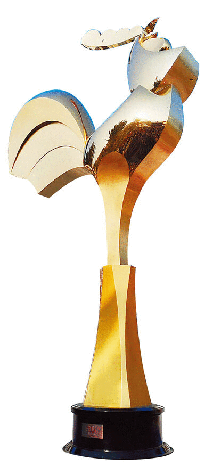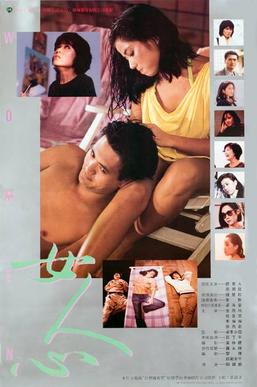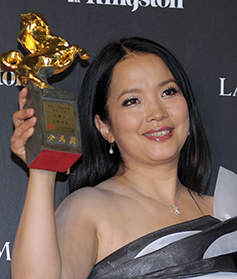Related Research Articles

The Golden Rooster Awards are film awards given in mainland China. The awards were originally given annually, beginning in 1981. The name of the award came from the year of the Rooster in 1981. Award recipients receive a statuette in the shape of a golden rooster, and are selected by a jury of filmmakers, film experts, and film historians. The awards are the Chinese equivalent to the American Academy Awards.

Cell Phone is a 2003 Chinese comedy-drama film directed by Feng Xiaogang and starring Ge You, Zhang Guoli, Xu Fan and Fan Bingbing. It was first released on 18 December 2003 in mainland China and was subsequently screened at the Cleveland International Film Festival on 18 March 2005. With box office earnings of over ¥50 million, Cell Phone became the highest-grossing domestic film in 2003.

China Huabiao Film Awards, also simply known as Huabiao Awards, is an annual awards ceremony for Chinese cinema. Named after the decorative Chinese winged columns (huabiaos), The Huabiao Awards were first instituted in 1957 as the Ministry of Culture Excellence Film awards. Between 1958 and 1979, no awards were given. In 1994, the awards were renamed "Huabiao." The ceremony is held in Beijing, and is the highest government honor in the film industry. Along with the Golden Rooster Awards and Hundred Flowers Awards, these are known as China's three main film awards.
Wu Yigong was a Chinese film director and producer.
Wang Fuli is a Chinese actress.

Cora Miao is a Hong Kong actress who was nominated for four Hong Kong Film Awards and four Golden Horse Film Festival awards, winning one. She won the Miss Photogenic award in the Miss Hong Kong Pageant in 1976 after graduating from the United States. She is married to film director Wayne Wang.

Women is a 1985 Hong Kong drama film directed by Stanley Kwan in his directorial debut. Like Kwan's following films, Women focuses on female characters and their efforts to overcome cultural restrictions. The cast includes Cora Miao, Chow Yun-fat, Cherie Chung and Elaine Jin. It was nominated for nine Hong Kong Film Awards including Best Picture.

The Hundred Flowers Awards are, together with the Golden Rooster Awards, the most prestigious film awards honouring the best in Chinese cinema, as well as Hong Kong cinema and the Cinema of Taiwan. They are classified as the Chinese equivalent of the United States' Golden Globes.
Li Xiuming is a mainland Chinese film actress. She won both of Golden Rooster Award and Hundred Flowers Award for Best Actress, for Xu Mao and His Daughters. Her most remembered role are "Chunmiao" in Xie Jin's Chunmiao and "Princess Peacock". In 1993, she retired from Beijing Studio.
Rickshaw Boy is a 1982 Chinese movie directed by Ling Zifeng, based upon the novel of the same name by Lao She. The film stars Siqin Gaowa, who won a Golden Rooster for her performance, and Zhang Fengyi.
The Golden Rooster Award for Best Picture is an award given to the best film at the Golden Rooster Awards.
Golden Rooster for Best Directorial Debut (中国电影金鸡奖最佳导演处女作) is the main category of Competition of Golden Rooster Awards, awarding to new director who directed the first feature film.

Lǚ Lìpíng is a Chinese actress.
Li Baotian is a Chinese actor. Li is a member of China Television Artists Association and China Film Association.

Ai Liya (Chinese: 艾丽娅; born 1 December 1965 in Inner Mongolia, is a Chinese film and television actress. She graduated from the Acting Department of Beijing Film Academy in 1985.
August First Film Studio, or Bayi Film Studio, is the only military film studio in China. Founded on August 1, 1952, it is a comprehensive film studio with the production capacity of feature films, battlefield documentaries, military education films, news documentaries, national defense scientific research films, TV dramas and other films. The unit's main business area is located in Fengtai District, Beijing, and consists of Wang Zuo Film and Television Base and Hubei Film and Television Base.
Events from the year 1981 in China.

Zhang Nuanxin was a Chinese film director, and a leading figure of the Fourth Generation of Chinese directors.
The 34th Golden Rooster Awards honoring best Chinese language films which presented during 2020–21. The award ceremony was held in Xiamen, China, and broadcast by CCTV-6.
Golden Rooster Award for Best Foreign Language Film is the main category of Competition of Golden Rooster Awards, awarding to foreign language films. When the first Golden Rooster Awards ceremony was held in 1981, there was no separate category for foreign language films because its awards were only given to domestic. It was created in 2021 for foreign language speaking films.
References
- ↑ 首届“金鸡奖”和杭州的电影传奇 今日早报 September 24, 2009